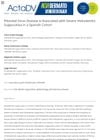Search
for
Sort by
Research
120-150 / 1000+ results
research A Novel 3D Printed Model of Infected Human Hair Follicles to Demonstrate Targeted Delivery of Nanoantibiotics
Nanoencapsulated antibiotics are more effective in treating hair follicle infections than free antibiotics.

research Pilonidal Sinus Disease Is Associated With Severe Hidradenitis Suppurativa in a Spanish Cohort
Pilonidal sinus disease is linked to more severe hidradenitis suppurativa.
research Cells to Surgery Quiz: April 2020
Certain surgical methods are better than routine incision for hidradenitis suppurativa, topical clindamycin and acitretin are effective treatments, men with HS have a risk of skin cancer, HS patients are more likely to die from heart problems, and specific genetic markers are linked to treatment response.
research Update on Hormonal Therapy in Hidradenitis Suppurativa
Hormonal therapies, especially antiandrogens, can help manage Hidradenitis Suppurativa.

research Vitamin D and the Skin: A Review for Dermatologists
Vitamin D is important for skin health, but more research is needed to understand its full effects and treatment potential.
research PI3K-Akt-mTOR and Associated Signaling Pathways as Molecular Drivers of Immune-Mediated Inflammatory Skin Diseases: Update on Therapeutic Strategy Using Natural and Synthetic Compounds
Certain natural and synthetic compounds may help treat inflammatory skin diseases by targeting a specific signaling pathway.
research Pleiotropic Role of Notch Signaling in Human Skin Diseases
Notch signaling disruptions can cause various skin diseases.
research Single-Cell RNA Sequencing Reveals Cellular and Transcriptional Changes Associated With M1 Macrophage Polarization in Hidradenitis Suppurativa
Immune cells in Hidradenitis suppurativa become more inflammatory and may be important for treatment targets.
research Lifestyle Factors Involved in the Pathogenesis of Alopecia Areata
Certain daily habits like stress, diet, and sleep can affect the severity of hair loss in alopecia areata.

research Off-Label Use of Botulinum Toxin in Dermatology: Current State of the Art
Botulinum toxin is effective for various skin conditions, but more research and awareness of side effects are needed.
research Advances in Molecular Pathogenesis of Hidradenitis Suppurativa: Dysregulated Keratins and ECM Signaling
Recent findings suggest that genetic factors, immune system issues, and skin cell defects might contribute to the development of hidradenitis suppurativa.

research How Our Microbiome Influences the Pathogenesis of Alopecia Areata
Our microbiome may affect the development of the hair loss condition Alopecia Areata, but more research is needed to understand this relationship.
research Lymph Node Involvement In Axillary Hidradenitis Suppurativa: A Clinical, Ultrasonographic And Bacteriological Study Conducted During Radical Surgery
Further research is needed to understand lymph node involvement in axillary hidradenitis suppurativa.

research The Multiple Consequences Of Obesity
Obesity leads to physical, metabolic, reproductive issues, higher healthcare costs, and mental health problems.
research Wigs And Alopecia Areata: Psychosocial Impact And Economic Considerations
Wigs help improve self-esteem and quality of life for people with hair loss from alopecia areata.

research Psoriasis Treatment in Difficult Locations: Scalp, Nails, and Intertriginous Areas
Treating psoriasis on the scalp, nails, and skin folds is challenging, often requiring systemic treatments for severe cases, with some success in topical and biologic treatments.

research Understanding Androgenetic Alopecia: Continuing Medical Education
The document concludes that androgenetic alopecia is common, has a genetic link, and can be diagnosed and treated with medications like finasteride and minoxidil.

research Industry Update: The Latest Developments in the Field of Therapeutic Delivery, July 2018
New partnerships, clinical trials, and drug approvals marked progress in therapeutic delivery in July 2018.

research Female Androgenetic Alopecia: New Pathophysiological Factors and Future Trends for a More Comprehensive Clinical Approach
New factors in female hair loss include genetics, hormones, stress, and inflammation; future treatments should also focus on these areas and consider the patient's emotional well-being.

research Clinical Management in Psychodermatology
The document concludes that treating skin conditions should include psychological care and a multidisciplinary approach is essential for effective management.

research Skin Diseases Due to Endocrine Alterations
Hormone imbalances can cause skin diseases, and understanding these links is important for diagnosis and treatment.

research Baldness, Acne, and Testicular Germ Cell Tumors
Men with testicular cancer were less likely to experience baldness and severe acne.
research Erosive Pustular Dermatosis (Chronic Atrophic Dermatosis of the Scalp and Extremities)
Erosive pustular dermatosis is a rare skin disease that's hard to treat and affects the scalp or legs.

research Serum Irisin: A Prognostic Marker for Severe Acne Vulgaris
Lower irisin levels in the blood may indicate more severe acne.

research The Use of Hormonal Antiandrogen Therapy in Female Patients with Acne: A 10-Year Retrospective Study
Hormonal antiandrogen therapy for acne is underused and can reduce the need for antibiotics.

research Isotretinoin Treatment Upregulates the Expression of P53 in the Skin and Sebaceous Glands of Patients with Acne Vulgaris
Acne treatment with isotretinoin increases the presence of p53, a protein, in skin and oil glands, which may help reduce acne severity.

research Isotretinoin Treatment Upregulates the Expression of P53 in the Skin and Sebaceous Glands of Patients With Acne Vulgaris
Isotretinoin treatment increases p53 levels in the skin, which may explain its effectiveness against acne.

research Isotretinoin Treatment Upregulates the Expression of p53 in the Skin and Sebaceous Glands of Patients with Acne Vulgaris
Isotretinoin treatment increases p53 levels in the skin, which may explain its effectiveness against acne.

research Common Dermatologic Conditions
The document concludes that quick referral and appropriate treatments are crucial for managing common skin conditions and preventing permanent damage.